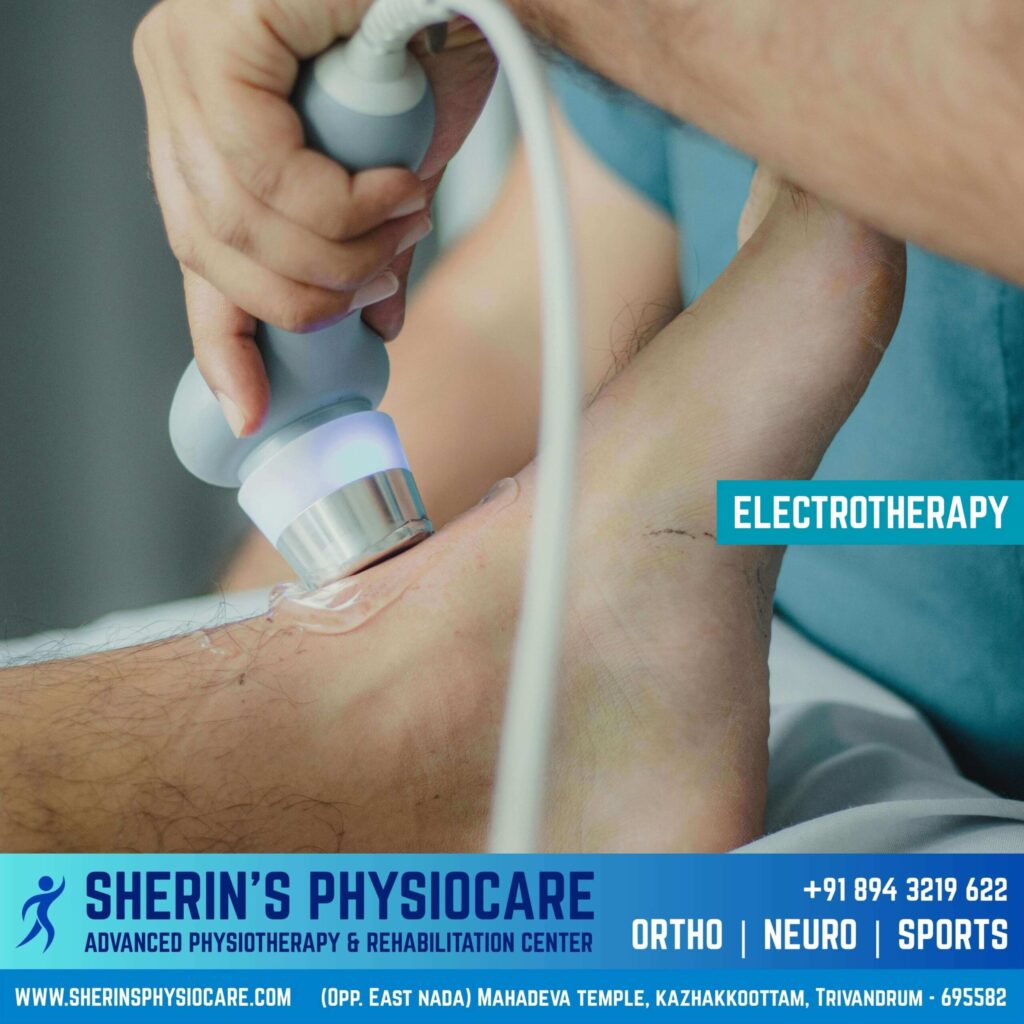
Electrotherapy
Electrotherapy is a modern physiotherapy technique that uses mild electrical impulses to stimulate nerves, muscles, and tissues for pain relief, healing, and rehabilitation. It’s a non-invasive, drug-free method widely used to reduce inflammation, improve circulation, strengthen muscles, and accelerate recovery from various injuries. Different types of electrotherapy modalities are selected based on the patient’s condition, such as:
- TENS (Transcutaneous Electrical Nerve Stimulation)
- IFT (Interferential Therapy)
- Ultrasound Therapy
- EMS (Electrical Muscle Stimulation)
- SWD (Shortwave Diathermy)
Acute or chronic pain (e.g., lower back pain, neck pain, arthritis)
Muscle weakness or spasm
Nerve-related pain (e.g., sciatica, neuropathy)
Joint stiffness & inflammation
Tendonitis, bursitis, plantar fasciitis
Sports injuries & ligament sprains
Post-operative rehabilitation
Post-stroke recovery (neurostimulation)
- Drug-free and non-invasive pain relief
- Accelerated healing of muscles, tendons & ligaments
- Reduces swelling and inflammation
- Enhances muscle re-education and strength
- Helps avoid surgical interventions in some cases
- Complements manual therapy and rehab exercises
- Improves mobility and quality of life
Electrotherapy- FAQ
1. What is electrotherapy in physiotherapy?
Electrotherapy is a treatment technique that uses electrical energy to reduce pain, improve circulation, and promote healing. It includes modalities like TENS, IFT, Ultrasound, EMS, and SWD, applied based on the patient’s condition.
2. Is electrotherapy safe?
Yes, electrotherapy is safe when administered by a qualified physiotherapist. The electrical stimulation used is mild and carefully monitored for comfort and effectiveness.
3. What conditions can electrotherapy treat?
Back and neck pain
Arthritis
Muscle weakness or spasms
Sciatica and nerve pain
Tendonitis, bursitis, plantar fasciitis
Post-surgical pain and stiffness
Sports and ligament injuries
4. Does electrotherapy hurt?
No. Most patients feel only a mild tingling or warmth during treatment. It is a comfortable, non-invasive method of pain relief and muscle stimulation.
5. How long does an electrotherapy session last?
A typical session lasts 15–30 minutes, depending on the condition and the type of modality used. It’s often combined with exercises or manual therapy.
6. How many sessions of electrotherapy will I need?
This depends on the severity of the condition. Some people feel relief after a few sessions, while others with chronic issues may need a longer course of treatment.
7. Can electrotherapy be used along with other treatments?
Absolutely. Electrotherapy is most effective when combined with manual therapy, therapeutic exercises, dry needling, and postural correction — as part of a holistic physiotherapy plan.
8. Are there any side effects of electrotherapy?
Side effects are rare. Mild redness or tingling may occur temporarily. Your therapist will adjust settings to ensure safety and comfort throughout the session.
9. Is electrotherapy suitable for everyone?
Electrotherapy is generally safe, but may not be suitable for patients with pacemakers, epilepsy, certain heart conditions, or during pregnancy. A thorough assessment will be done beforehand.
10. Why choose SHERIN'S PHYSIOCARE for electrotherapy?
At SHERIN’S PHYSIOCARE, Kazhakkoottam, we use advanced electrotherapy equipment and personalized treatment protocols, delivered by trained professionals, to ensure safe and effective recovery for every patient.
